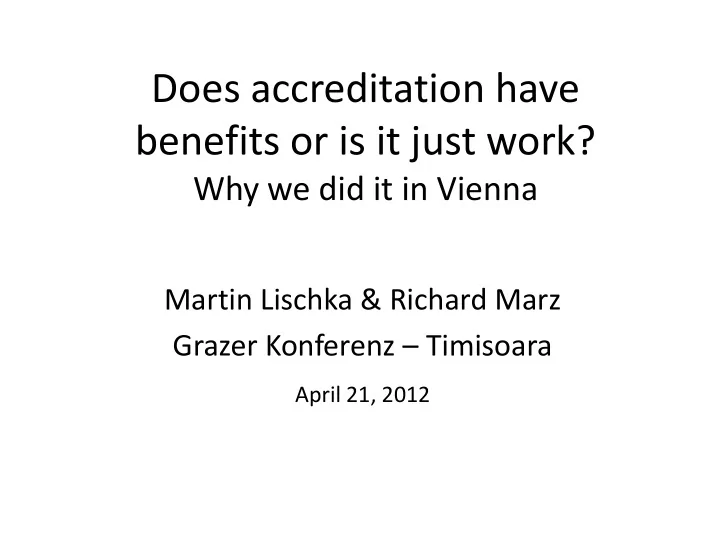

Does accreditation have benefits or is it just work? Why we did it in Vienna Martin Lischka & Richard Marz Grazer Konferenz – Timisoara April 21, 2012
Stimaţi colegi, Cu părere de rău doresc să vă informez, că din motive familiare nu am putut să mă deplasez de această dată la Timisoara, cu toate ca mi- aş fi dorit foarte mult sa fiu alături de voi. Totodată doresc să vă urez mult success în desfăşurarea projectului EMEDIQUAL.
First of all • it is work & • it may have benefits Therefore, we attempt to describe what we have learned from two evaluation cycles in Vienna: 2008/09 and 2010/11
Why? Internal and external factors: • Advisory board (3 international, 2 local members) recommended an accreditation using the Swiss process of voluntary national accreditation 1999/2000 as a model this met with • „Leistungsvereinbarung“ between Ministry & MedUni Vienna
How: • Project plan, agency: aqa , funding • Project organisation , time frame • Agreement on: external peers, standard • Self-report ( team , retreat , SWOT-analysis, open communication) • Site visit • Draft report • Commentaries • Final report and final statement of MedUni Wien • Conclusion
Project organisation
Time frame Activity Cycle 1 m Cycle 2 m 01/2008 03/2010 Project start Self report 11/2008 10/2010 01/2009 12/2010 Site visit Draft report 04/2009 02/2011 Conclusion & requirements 05/2009 05/2011 15 Debriefing, agenda 06/2009 18 05/2013 Next ?
Standard: wfme 2007 www.wfme.org Department für medizinische Aus- und Weiterbildung DEMAW
Standard /1 Basic standards: • The medical school must define and state the methods used for assessment of its students, including the criteria for passing examinations. • The reliability and validity of assessment methods must be documented.
Standard /2 Quality development standards: • The reliability and validity of assessment methods should be evaluated and new assessment methods developed. • Assessments and methodologies used should be open to scrutiny by external authorities.
Standard /3 Annotations: • The definition of methods used for assessment may include consideration of the balance between formative and summative assessment, the number of examinations and other tests, the balance between written and oral examinations, the use of normative and criterion referenced judgements, and the use of special types of examinations, e.g. objective structured clinical examinations (OSCE). • Evaluation of assessment methods may include an evaluation of how they promote learning ……………………
Results /1 formal accreditation until 05/2016 Department für medizinische Aus- und Weiterbildung DEMAW
If you are interested Vienna results • Cycle 1: Emphasis on Evaluation www.aqa.ac.at/file_upload/MUW2009_Gutachterbericht.pdf • Cycle 2: Emphasis on Accreditation www.aqa.ac.at/file_upload/Gutachten_ProgrammAkkreditie rung_MedUniWien_2011.pdf
Results /2 cycle 1: • debriefing workshop with peers on key topics • > 90 commentaries and recommendations • Prioritization of recommendations: +++,++, +, n.a. – including explanatory statements
Results /2 cycle 1: • debriefing workshop with peers on key topics • > 90 commentaries and recommendations • Prioritization of recommendations: +++,++, +, n.a. – including explanatory statements cycle 2: • Fewer recommendations • Some requirements (e.g. QMS) • Internal follow-up (?)
Follow-up (e.g.): faculty development – evaluation model NOTA BENE: timed for presentation Effects in the field, e.g. by approx. systemic Outcome 06/2015 Effects in practice, e.g. teaching, assessment behavior „learning results“ , e.g. results qualitative information from peer reviews Comsumer satisfaction, reaction „happiness evaluation“
What we have learned: process • A (reasonable) tight time frame may be helpful • A SWOT-analysis at the outset is helpful to balance description of strengths and weaknesses • Do not underestimate your strengths • Open communication smoothes the site visit • If you want to distract from problems, peers may focus on them even more
What we have learned: results • There may be faults in the draft report • Final recommendations may be numerous – they should be evaluated and prioritized • Conditions imposed have to be dealt with by following an agenda in order to be met • Evaluation / accreditation without an agenda for follow up und re-evaluation is useless
What we have learned: in general Again: • Evaluation / accreditation without an agenda for follow up und re-evaluation is useless • Not every little course needs to be accredited if quality assurance is effective • Program evaluation and re-evaluation of core courses like medicine is advisable
Ways an institution may learn Strategic Learning Intended Deliberate Realized Strategy Strategy Strategy Unrealized Emergent Strategy Strategy
To sum it up: Since … experience showed that most educational decisions of importance, … , continued to be taken in a political interpersonal milieu, where evidence plays a minor role …. evaluation based measures may contribute to at least deliberate actions in education acc. to: J Goldie, Evaluating educational programmes, Medical Teacher 28 (3) 210 – 224 (2006) Department für medizinische Aus- und Weiterbildung DEMAW
Recommend
More recommend